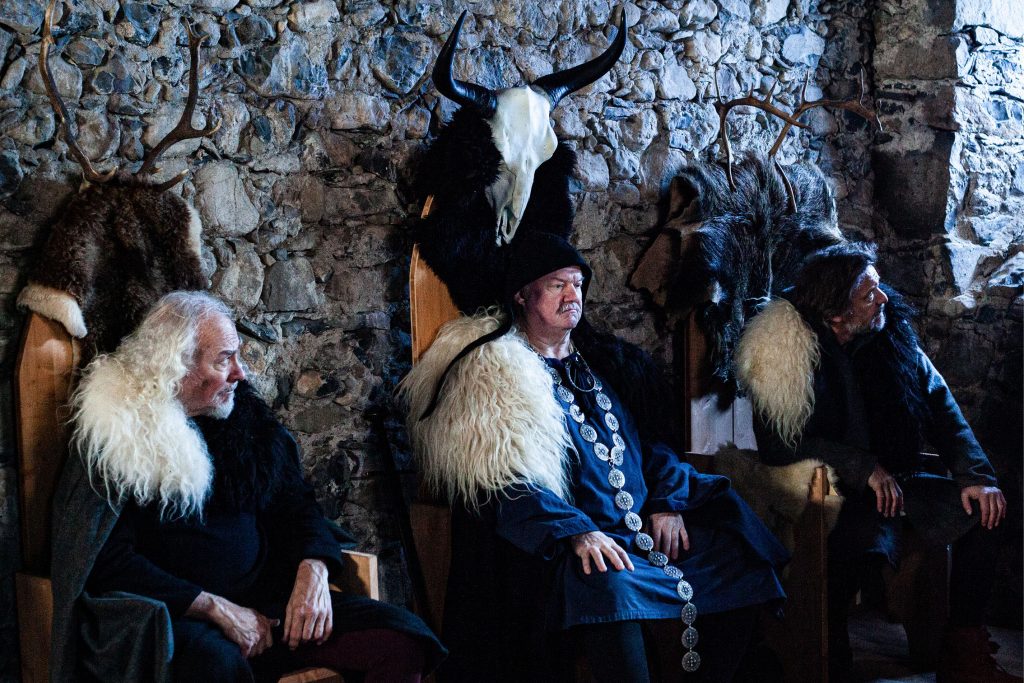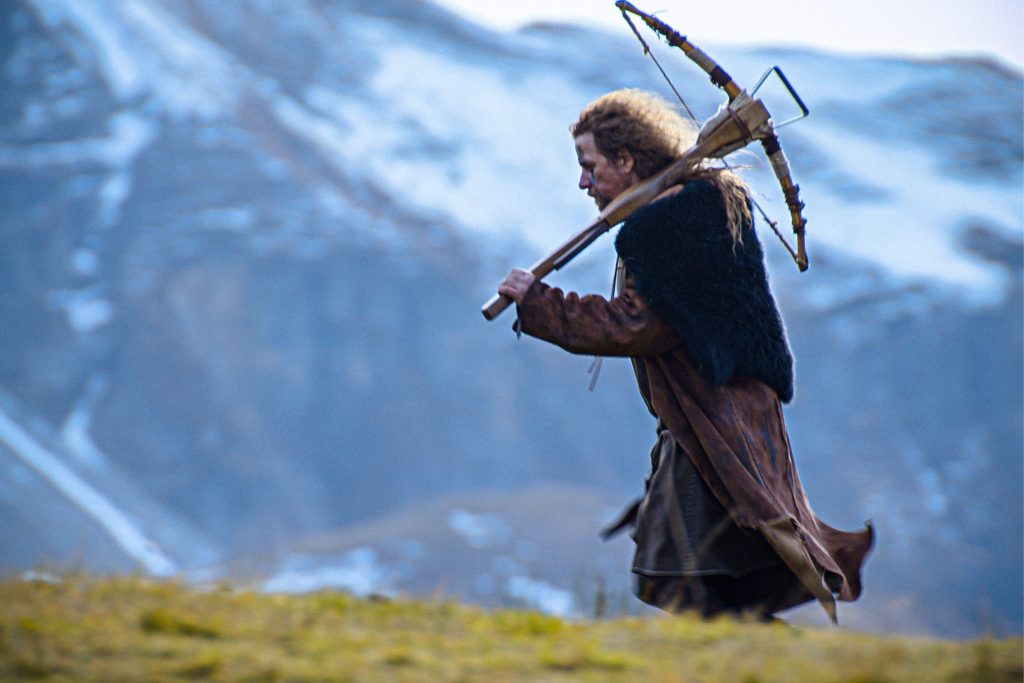A Few Words
About the Movie
A Few Words About the Movie
This project does neither aspire to Schiller’s neoclassical figure nor is it a symbol in Switzerland’s resistance to the European Union’s new laws on firearms. It is paramount that nobody can tame the legendary figure for their own purpose as this would contradict the nature of the legend itself.


TELL – a Hunter's Tale
King Rudolf von Habsburg dies in early July 1291 and leaves the valleys surrounding Lake Lucerne with a power vacuum. The free were promised for the old laws to stay in place, namely imperial immediacy, but never managed to contractually ratify this. The new bailiffs, sent by Habsburg, do not have much respect for the old laws. Bailiffs Wolfenschiessen and Landenberg rage in Unterwalden, but it is mainly bailiff Gissler who haphazardly reigns over Schwyz and Uri. The local gentry fears for their rights and privileges, and rightly so. A revolt is planned but various excuses are found for it to constantly get pushed back.
Synopsis
Glance over the movie’s story below…
The Story
Hunter Wilko Tell belongs to the freemen in the Uri valley but is not accepted as one of theirs by the old establishment. The beginning of the movie shows how Tell gains his freedom as a child when he is brought to the bailiff of Uri after robber-knights had murdered his father. Tell is given the right to hunt and the kind bailiff gives him a crossbow that should make it easier for Tell to provide for his mother and siblings. Although many old-established families reject that Tell is now a free man despite not being one of theirs, it is understood that Tell is the key to connecting with the bondsmen and serfs. The commoners trust him but not the patricians for good reason. However, the patricians need the bondsmen to support their revolt for it to be successful. Tell however does not trust the patricians either and shows no intention of getting involved into politics with the local gentry.
Bailiff Gissler tries to strike a deal with the gentry but they secretly continue to plan their uprising, even manage to conspire with the valleys of Schwyz and Unterwladen in a secret meeting held in a glade. Gissler is disappointed in the patricians of Uri who declined his offers and is now determined to get them under his yoke, even if it meant breaking them. His despotism reaches new heights and peaks when he puts up a hat in the valley’s capital that people should now humbly salute to.
Despite Gissler’s despotism, it is actually his younger brother Ulrich who is known for the most excessive deeds. Ulrich prohibits the freemen from hunting and confiscates Tell’s crossbow. Humiliated and robbed Tell finds himself in the middle of the same politics he did not want to get involved in. Against the advice of the leader (“Landammann”) of the dale-ship Uri and the despite the pleas of his wife Heiki, Tell is determined to address the bailiff in person on court day to demand back his rights and his weapon.
Heiki’s fears prove to be well-founded when court day, held by the Moor Lake under the oak, fails and escalates. Instead of reclaiming his rights, Tell, known for his aim, is forced to shoot an apple off his son’s head. Tell is on his own, the gentry who had talked large is now at a loss for words and lets the gruesome spectacle enroll. Although Tell succeeds and hits the apple, Gissler realizes that he is bad news and a potential rebel and wants to have him arrested. Finally, this move outrages the gentry which enables Tell to flee. He hides but someone rats him out and Gissler busts him. Tell is brought to the reeve’s castle by boat, where he will be arrested. Yet, the boat gets into a storm and Tell can flee again. Now it is personal: Tell gears up to fight a private war against Gissler and Habsburg. Employing Guerilla tactics, he attacks patrols of lansquenets, steals their weapons and advances to become a popular hero who is sung about in taverns.
The planned uproar by the Urner gentry is off the table, they have been bought by Gissler which prompts Tell to act on his own authority. This alarms duke Albrecht who believes the access to the pass from Uri to Italy, an important trade route Habsburg is interested in, will be put in danger by Tell’s actions who may lead to an uproar. Gissler needs to deal with Tell if he wants to stay bailiff.
In December 1291 Gissler and a small troop ride to Altdorf to sit in judgment, punish potential rioters and to hang the most obstreperous of the freemen of Uri from the oak tree. But Gissler will not reach Altdorf. He is confronted by Tell and held accountable for his crimes. While this finishes Tell’s hunt, it initiates a new and eternal hunt at the same time: Gissler’s death forces the gentry’s hand. They can no longer expect an amicable relationship with their occupants and need to beat them to the punch. To avoid large-scale punishment for Tell’s actions they have to risk the rebellion now. And indeed, here the movie follows the legend, shortly after Christmas 1291 they storm the castle and towers of the reeves and enforce change which, at least as far as the public is concerned, eventually, through meander and detours, leads to the foundation of modern Switzerland.
and beyond...
The plot is accompanied by numerous mystical elements. Hunter Tell, for example, is looking for a white stag that he remembers from an encounter as a child. He suspects that it is not an ordinary animal. In Celtic and Alemannic mythology, the stag is said to carry the soul. The movie is deliberately ambiguous as to whether the mystical creature carries the soul of Tell’s murdered father or if it is an appearance subjective to Tell. Either way, in the movie the occurrence turns into reality for Tell.
Specs and details
Format
DCP
Filming Country
Switzerland
Silvertrain Productions
RSC – Reinhard Steiner Creation
Co-Production Companies
Constantin Film und Entertainment AG
Mooo Pictures, blue Entertainment
Swiss Distribution
Praesens-Film AG
WORLD RIGHTS
Silvertrain Productions
N.N.
ISAN
0000-0005-0720-0000-E-0000-0000-W
SUISA Nr.
1015.428
Tell on IMDb
THANKS TO OUR SUPPORTERS


